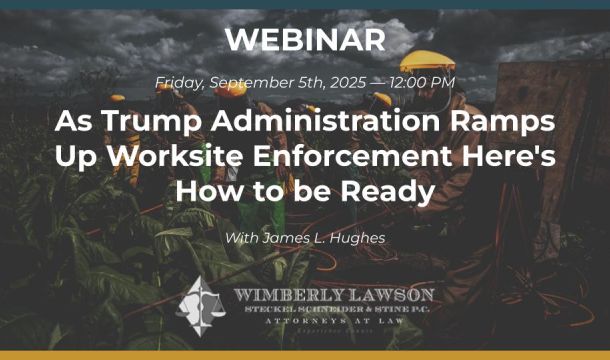GOVERNMENT Position: Worker Presents New Social Security Number and States Previous Documents Were Not Real
One of the most common (and difficult) immigration issues faced by employers occurs when an employer has accepted an employee's work authorization documents that appear genuine, but the employee later comes in and presents new identity and work authorization documents and states that the previous documents were not real. Employers are concerned whether this situation opens the employer up to any discrimination issues in any way if it chooses to keep or terminate the employee. The U.S. Department of Justice's Office of Special Counsel for Immigration-Related Unfair Employment Practices (OSC) issued a technical assistance letter on January 8, 2015, explaining an employer's responsibilities in this situation. Because of the importance of the issue, significant portions of the "correct steps" and opinion are stated below:
In a situation where an employer has properly completed these steps, and an employee later provides the employer with new work authorization documentation and explains that the previously-presented documentation was not genuine, U.S. Citizenship and Immigration Services ("USCIS") – the agency that publishes the Form I-9 – provides additional guidance. According to the USCIS Handbook for Employers, Guidance for Completing Form I-9 (Form M-274 Rev. 04/30/13), available at http://www.uscis.gov/sites/default/files/files/form/m-274.pdf:
"You may encounter situations other than a legal change of name where an employee informs you or you have reason to believe that his or her identity is different from that previously used to complete the Form I-9. For example, an employee may have been working under a false identity, has subsequently obtained a work authorized immigration status in his or her true identity, and wishes to regularize his or her employment records. In that circumstance you should complete a new Form I-9. Write the original hire date in Section 2, and attach the new Form I-9 to the previously completed Form I-9 and include a written explanation.
In cases where an employee has worked for you using a false identity but is currently work authorized, the I-9 rules do not require termination of employment . . . ."
USCIS Handbook for Employers at 24.
This Office cannot identify any violation of 8 U.S.C. § 1324b when an employer consistently accepts documents that employees choose to present that reasonably appear to be genuine and relate to the individual, regardless of whether an employee admits that the documents previously presented for employment eligibility verification were "not real." Nor can this Office identify any 1324b violation when an employer allows an employee to continue employment under the circumstances you present. However, to the extent an employer rejects valid work-authorization documentation or terminates employees because of their citizenship status or national origin, the employer could violate the anti-discrimination provision.
A further portion of the technical assistance opinion is quite important although it will not be quoted. It goes on to state that an employee who is terminated under the circumstances described above may allege citizenship status discrimination and may also allege national origin discrimination. The OSC indicates that an employer with a consistently-followed policy of terminating individuals for providing false information during the hiring process may have a legitimate non-discriminatory reason for the termination, and that whether or not OSC concludes that such a termination violates the anti-discrimination provision depends on the facts presented. The entire OSC technical assistance letter can be viewed at http://op.bna.com/dlrcases.nsf/ r?Open=lfrs-9t7sbn.
Wimberly & Lawson Comments
The OSC’s technical assistance opinion cautions employers that terminating all employees who present different names, Social Security Numbers, or other document information, for falsifying documentation to the company, may result in discrimination claims. The first concern is whether such an employer has consistently followed a policy of terminating all employees who are determined to have provided false information, particularly since it appears common for employees to present documents that are falsified in some manner. For example, some studies indicate that 75% of job applicants falsify their employment application in some way.
A second concern relates to the natural reaction of an employer to simply request additional documentation from the employee to determine whether or not the employee is currently work authorized. The same technical assistance letter cautions that an unfair documentary practice occurs when an employer rejects valid Form I-9 documentation, demands more or different Form I-9 documentation, or requests specific I-9 documentation based on an employment-authorized individual's citizenship status or national origin. This advice is given in respect to what the OSC believes are "the correct steps going forward."
These issues are also going to come to the forefront as the implementation of President Obama's deferred prosecution policy goes into effect, probably around the middle of the year. Because of this deferred prosecution policy, employers should expect that some employees will be coming forward with new identity and work authorization information, and employers will be required to act in accordance with not only the position of ICE (Immigration and Customs Enforcement), but also with the position of the OSC as indicated in the technical assistance letter discussed herein.
For those employers who accept the new documents and continue the employment of the workers, it is important to maintain records of the change in identity and work authorization documents. Such employers should prepare new Form I-9s based on the new documents and attach the new Form I-9s to the old Form I-9s for the workers. Other employment records should cross reference the name and Social Security number changes so that all relevant documents can be retrieved when necessary.
For those employers who continue the practice of terminating employees who confess to providing false identification and work authorization documents in the past, it is important to maintain records to show a consistent practice of terminating all employees who provide false information during the hiring process.
For questions or additional information call James W. Wimberly, Jr., Jim Hughes, or Ray Perez, or any other attorney at (404) 365-0900 or at jww@wimlaw.com, jlh@wimlaw.com or rp@wimlaw.com.
Related Content
Get Email Updates
Recent Content

TPS Update (as of 1/19/2026)

Do Employer Rules Regarding Marijuana Need To Change In Light Of The New Presidential Executive Order?

Effect of Administration’s Abandonment of Disparate Impact in the Area of Discrimination Continues to Be Felt

Issues Arise for Employers Concerning the Overtime Tax Break

NLRB To Move Quickly as Quorum Is Restored




